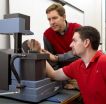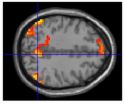(Press-News.org) COLUMBUS, Ohio – Young people may crave boosts to their self-esteem a little too much, new research suggests.
Researchers found that college students valued boosts to their self-esteem more than any other pleasant activity they were asked about, including sex, favorite foods, drinking alcohol, seeing a best friend or receiving a paycheck.
"It is somewhat surprising how this desire to feel worthy and valuable trumps almost any other pleasant activity you can imagine," said Brad Bushman, lead author of the research and professor of communication and psychology at The Ohio State University.
Bushman conducted the research with Scott Moeller of Brookhaven National Laboratory and Jennifer Crocker, professor of psychology at Ohio State. The study appears online in the Journal of Personality and will be published in a future print edition.
In two separate studies, the researchers asked college students how much they wanted and liked various pleasant activities, such as their favorite food or seeing a best friend. They were asked to rate how much they wanted and liked each activity on a scale of 1 (not at all) to 5 (extremely).
One of the items they were asked about was self-esteem building experiences, such as receiving a good grade or receiving a compliment.
"We found that self-esteem trumped all other rewards in the minds of these college students," Bushman said.
Those students who indicated they highly valued self-esteem also showed it in the laboratory.
In one study, the participants took a test which purportedly measured their intellectual ability. Afterwards, the students were told if they waited another ten minutes, they could have their test re-scored using a new scoring algorithm that usually yields higher test results.
Students who highly valued self-esteem were more likely to stay to get the new scores.
"They were willing to spend their own precious time just to get a small boost in their self-esteem," Bushman said.
Bushman said there is nothing wrong with a healthy sense of self-esteem. But the results of this study suggest many young people may be a little too focused on pumping up their self-esteem.
Here's why: for all the pleasant activities examined in this study, participants were asked to rate both how much they liked the activity and how much they wanted it. Both questions were asked because addiction research suggests that addicts tend to report they "want" the object of their addiction (drugs, alcohol, gambling) more than they actually "like" it, Bushman said.
"The liking-wanting distinction has occupied an important place in addiction research for nearly two decades," Moeller said. "But we believe it has great potential to inform other areas of psychology as well."
In this study, participants liked all the pleasant activities more than they wanted them, which is healthy, Bushman said. But the difference between liking and wanting was smallest when it came to self-esteem.
"It wouldn't be correct to say that the study participants were addicted to self-esteem," Bushman said. "But they were closer to being addicted to self-esteem than they were to being addicted to any other activity we studied."
Findings showed that people with a strong sense of entitlement were the ones who were most likely to "want" the good things in life – including boosts to their self-esteem – even more than they actually "like" them.
Entitlement was measured as part of a narcissism scale which participants completed. In the scale, participants had to choose which of two statements they most agreed with. For example, people who scored high on entitlement were more likely to agree with "If I ruled the world, it would be a much better place" rather than "The thought of ruling the world frightens the hell out of me."
"Entitled people want all the good things in life, even if they don't particularly like them," Bushman said. "Of course, there's no problem with enjoying good things, but it is not healthy to want them more than you like them."
Bushman said he sees danger in this obsession with self-esteem. Research has shown that levels of self-esteem have been increasing, at least among college students in the United States, since the mid-1960s.
"American society seems to believe that self-esteem is the cure all for every social ill, from bad grades to teen pregnancies to violence," he said. "But there has been no evidence that boosting self-esteem actually helps with these problems. We may be too focused on increasing self-esteem."
Study co-author Crocker added, "The problem isn't with having high self-esteem; it's how much people are driven to boost their self-esteem. When people highly value self-esteem, they may avoid doing things such as acknowledging a wrong they did. Admitting you were wrong may be uncomfortable for self-esteem at the moment, but ultimately it could lead to better learning, relationships, growth, and even future self-esteem."
###
The study was partially supported by grants from the National Institute of Mental Health and the National Institute on Drug Abuse.
Contact: Brad Bushman, (614) 688-8779; Bushman.20@osu.edu
Written by Jeff Grabmeier, (614) 292-8457; Grabmeier.1@osu.edu
END
AMES, Iowa – Michael Kessler has worked with polymers that repair themselves when they crack. And he's worked with polymers made from vegetable oils. Now he's working to combine the two technologies.
Kessler, an Iowa State University associate professor of materials science and engineering and an associate of the U.S. Department of Energy's Ames Laboratory, is researching and developing biorenewable polymers capable of healing themselves as they degrade and crack.
"If successful, the results of this research will provide biorenewable alternatives to petroleum-based ...
VIDEO:
Extracting mitochondria from a human cell (larger object on bottom right) is a tricky process. NIST researchers recently developed techniques that can surgically remove these tiny cellular engines, potentially enabling...
Click here for more information.
Medical researchers who crave a means of exploring the genetic culprits behind a host of neuromuscular disorders may have just had their wish granted by a team working at the National Institute of Standards and Technology ...
Brain scans of children with attention-deficit/hyperactivity disorder (ADHD) have shown for the first time why people affected by the condition sometimes have difficulty in concentrating. The study, by experts at The University of Nottingham, may explain why parents often say that their child can maintain concentration when they are doing something that interests them, but struggles with boring tasks.
Using a 'Whac-a-Mole' style game, researchers from the Motivation, Inhibition and Development in ADHD Study (MIDAS) group found evidence that children with ADHD require ...
Is the expansion of the universe accelerating for some unknown reason? This is one of the mysteries plaguing astrophysics, and somewhere in distant galaxies are yet-unseen supernovae that may hold the key. Now, thanks to a telescope calibrated by scientists from the National Institute of Standards and Technology (NIST), Harvard University and the University of Hawaii, astrophysicists can be more certain of one day obtaining an accurate answer.
The NIST scientists traveled to the summit of Haleakala volcano in Hawaii to fine-tune the operation of billions of light-collecting ...
As the day draws nearer for the world to run out of the unique addresses that allow us to use the Internet—now predicted to happen by the end of 2012—researchers at the National Institute of Standards and Technology (NIST) have issued a guide for managers, network engineers, transition teams and others to help them deploy the next generation Internet Protocol (IPv6) securely.
Guidelines for the Secure Deployment of IPv6 (NIST Special Publication 800-119), describes the features of IPv6 and the possible related security impacts, provides a comprehensive survey of mechanisms ...
Two new draft publications from the National Institute of Standards and Technology (NIST) provide the groundwork for a three-tiered risk-management approach that encompasses computer security risk planning from the highest levels of management to the level of individual systems. The draft documents have been released for public comment.
Both publications are a part of NIST's risk management guidelines, which have been developed in support of the Federal Information Security Management Act (FISMA), and adopted government wide to improve the security of government systems ...
In a groundbreaking achievement that could help scientists "build" new biological systems, Princeton University scientists have constructed for the first time artificial proteins that enable the growth of living cells.
The team of researchers created genetic sequences never before seen in nature, and the scientists showed that they can produce substances that sustain life in cells almost as readily as proteins produced by nature's own toolkit.
"What we have here are molecular machines that function quite well within a living organism even though they were designed ...
(PHILADELPHIA) Elevated fat and cholesterol levels found in a typical American-style diet play an important role in the growth and spread of breast cancer, say researchers at the Kimmel Cancer Center at Jefferson.
The study, published in the January issue of The American Journal of Pathology, examines the role of fat and cholesterol in breast cancer development using a mouse model. The results show that mice fed a Western diet and predisposed to develop mammary tumors, can develop larger tumors that are faster growing and metastasize more easily, compared to animals eating ...
Madison, WI December 28, 2010 – The Australian Government National Water Commission funded a study to establish an approach to assess the quality of water treated using managed aquifer recharge. Researchers at Australia's CSIRO Land and Water set out to determine if the en product would meet standard drinking water guidelines.
At the Parafield Aquifer Storage, Transfer and Recovery research project in South Australia, the team of scientists harvested storm water from an urban environment, treated it in a constructed wetland, stored it in an aquifer, and then recovered ...
Menlo Park, Calif. — The Crab Nebula, one of our best-known and most stable neighbors in the winter sky, is shocking scientists with a propensity for fireworks—gamma-ray flares set off by the most energetic particles ever traced to a specific astronomical object. The discovery, reported today by scientists working with two orbiting telescopes, is leading researchers to rethink their ideas of how cosmic particles are accelerated.
"We were dumbfounded," said Roger Blandford, who directs the Kavli Institute for Particle Astrophysics and Cosmology, jointly located at ...



